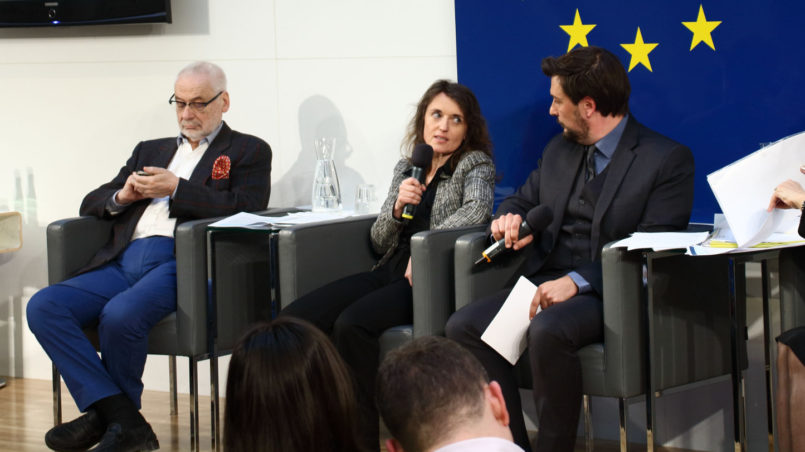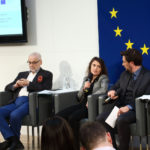EU Council Presidency – What can Austria Contribute to the European Union?

In July 2018 Austria takes over the EU Presidency for six months – for the third time after 1998 and 2006. On this occasion, the Institute for the Danube Region and Central Europe hosted a panel discussion at the House of the European Union in Vienna on 26 March 2018 entitled “Austria’s EU Presidency and the Challenges for the Future of a Unified Europe”.
The lawyer and former politician, Dr. Erhard Busek, with his charming eloquence the “star guest” of the evening, opened the discussion with an introduction in which he pointed out that the citizens of Europe make up about seven percent of the world population. This alone has traditionally made Europe very important in a global comparison, but it is declining.
Southeastern Europe, in particular, is of crucial importance, as this region forms a bridge to the Middle East, one of the most problematic regions in world politics. Austria could play an important role here. Busek described today’s widespread “mental provincialism” as “extremely dangerous”.
Dr. Elena Kirtcheva, former Bulgarian Ambassador to Vienna, took part in the discussion as a representative of the country which will hand over the Council Presidency to Austria. She reported on the current work of the Bulgarian Presidency, the first of the country that only joined the EU in 2007. She pointed out in particular that Bulgaria strongly supported the countries of the Western Balkans that had not yet joined the EU, because “the European Union needs these countries”. The fact that there is still a lack of networking is already evident from the gaps in the transport infrastructure:
Skopje and Sofia, for example, are the only European capitals not connected by railway lines. But Turkey also belongs to the Balkan region. The Bulgarian diplomat called it a big mistake to admit Romania and Bulgaria to the EU only in 2007 and not together with the other Eastern European countries already in 2004 because this had favoured the emergence of authoritarian structures in these countries.
Regina Kothmayr, Head of the EU Accession Task Force in the Federal Chancellery, was asked by moderator Sebastian Schäffer about the problems of the British withdrawal from the EU. This is particularly urgent, she replied because the Brexit negotiations must be brought to a conclusion during the Austrian Presidency. “Britain’s vote in 2016 was a great shock, “Kotmayr said, but nevertheless it has been possible to maintain the unity of the remaining 27 EU states. “Negotiations must continue, and we hope that we will bring this to an end.“
Erhard Busek was also asked about Brexit and he repeated his plea for “more Europe”: “If everyone thinks only of himself, nothing will remain” because the problems have, for a long time, been supraregional and can only be solved through international cooperation. The currently good economic situation is also a result of internationality.
National selfishness would simply no longer work today, and I would like our government to have the courage to say so.
Austria on its own would not be able to solve the problems of Brexit, but the integration of the Western Balkans must be pushed forward in any case. This alone for political reasons: Busek recalled that the admission of Spain and Portugal to the EU in the 1980s, for example, did not initially bring any economic benefits, but did do so politically, because it was able to substantially promote the stabilisation of these countries, which were still dictatorships shortly before. Busek, therefore, sees it as a very important task for Austria to push ahead with the integration of the Western Balkan countries.
Kirtcheva is also of the opinion that Austria has a special proximity to the Western Balkans and can use this: “From here one can understand these countries better than from Western Europe.” Austria should give more and stronger signals to these countries. Thus, the infrastructure in Southeastern Europe is currently being built up by China, although this would actually be a European task. She was critical of Europe’s competition with China and said from her home country’s perspective: “We want more EU!”
One question from the audience raised a currently sensitive topic: “Russia is also part of Europe. What should Austria’s position be?” While Kotmayr evaded an answer to this “extremely sensitive and challenging topic”, Busek was clearer: “I am certainly not ‘friend’ of Putin, but nevertheless very much in favour of seeking dialogue with Russia”. The expulsion of Russian diplomats from many Western countries, which became known on the day of the discussion, had “a certain degree of absurdity”, that would not impress anyone in Russia, Busek was sure. Economic sanctions are a much more effective means of exerting pressure because what hit Russia the most recently was the fall in oil prices.
But the maintenance of the dialogue with Russia is absolutely necessary because Russia is also a part of Europe and there are many similarities, “and Austria has good prerequisites for this“. Cultural foundations that still originate from the monarchy could be used by Austria to promote dialogue with Eastern European countries. At present, relations with Austria’s eastern neighbours are undervalued and too often discussed only in relation to the labour market.
At the end of the discussion, moderator Schäffer asked the question: “Which Europe do you want?”
A Europe of values, a Europe of tolerance, a Europe on an equal footing,
Kirtcheva replied. Kotmayr demanded: “Europe must be supported by the masses and must not be an elite project“. And Erhard Busek wished for “a Europe that would make better use of its immense cultural treasure“.
As usual in discussions in the “House of the European Union in Vienna”, the participants in the talks agreed that “more Europe” was necessary. There was also a consensus on the question that Austria should use its historically developed good relations to intensify the dialogue with the countries of the Western Balkans. To solve the Brexit problem, however, the country is dependent on collaborations.
Translation German-English: Anna Dichen
Credits
| Image | Title | Author | License |
|---|---|---|---|
 |
VA-EU-Ratspräsidentschaft- | Idealism Prevails | CC BY-SA 4.0 |
